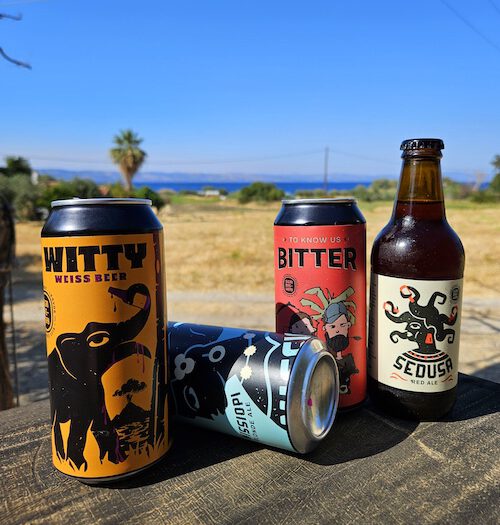(Photo: Sophie Huijzer)
The biggest beer drinkers can be found in the Czech Republic, followed by Austria and Romania. On the list of the 65 countries with the largest beer consumption, Greece doesn’t even appear; while beer drinking is indeed on the rise in the land of the blue sea and its gods.
The invention of beer brewing is attributed to the Sumerians in Mesopotamia, who had an actual beer goddess: Ninkasi. In their epic poem Gilgamesh (circa 2100 BC), beer is already being praised as one of the pleasures of life. Then the drink came to Egypt, where brewing beer was considered a gift from the gods. The land of the pharaohs also had a beer goddess: Tenenit. Sometimes, workers were even paid in beer. It is no wonder that when Cleopatra started taxing beer to finance her wars, she became less popular.
Apparently, the ancient Greeks weren’t very fond of that blond foamy gold, even though Archaeologists found prehistoric breweries from the Bronze Age (3300 – 1200 BC) in Archontiko and Argissa (Northern Greece). When beer made its way to Greece via Egypt, it may have been a brief hit, but it soon fell into oblivion. The same happened to the Romans, who learned to drink beer from the Greeks but still preferred a glass of wine.
I may understand why: very ancient beers were a kind of sour porridge, made from fermented grain or bread and flavored with herbs and vegetables. The thick sludge had to be slurped up with a straw because bits of the ingredients were still floating around in it. Thus, the invention of the straw is also attributed to the Sumerians.
In 1832, the Bavarian prince Otto ascended the throne of Greece and brought the brewer Fix from Germany, who immediately got to work brewing beer in Athens: the clear beer we know today. More Greeks then started drinking beer, and Fix beer is still active on the Greek beer market.
Beer is brewed with water. The taste of water is determined by different minerals and is never the same anywhere. Therefore, flavoring the water has become an important aspect of brewing beer.
The Sigri Brewery started as a nomadic brewery, producing beer on other islands with water that was available there. However, since last year, the beer flows from the kettles of their own brewery in Sigri, making them the first beer brewery on Lesvos. Now they brew with water that has embraced the history of the island. Just imagine: the ground around Sigri, nourished by the ancient springs of Paliochori, is strewn with thousands of petrified trees. Once, the land was filled with sequoias, among which prehistoric animals had their hunting grounds, such as dinosaurs, giant deer, and the trunked animal Deinotherium (Proboscidea), a type of enormous, elongated elephant.
Lesvos just was a kind of Jurassic Park. Now the island is home to the desert-like Park with the Petrified Trees: impressive, but nothing compared to a tropical forest with prehistoric animals, like those strange deinotherium, whose bones are also embedded here and there in the earth of western Lesvos.
The Sigri Brewery connects the present with the past: it began with the blonde Nissiopi and the dark Sedusa beer, both named after islets that protect the harbor of Sigri from nasty stormy weather and unwanted intruders. Agamemnon, with his fleet on the way to Troy, mistook Nissiopi for Mythimna (Molyvos) and ordered his men to pass the island as quietly as possible so they would not be noticed. Therefore, Nissiopi is also called ‘The Silent Island’. When you drink Nissiopi beer, you may become silenced due to its lovely fresh taste; and the same for the dark Sedusa, which features a beautiful beer-drinking Medusa on the can, although that’s for a more serious mood.
With the own micro brewery came a third beer — Bitter, a beer for people who enjoy a subtle bitter aftertaste. And now there’s a white beer added: Witty. While the Bitter cans are adorned with a cheerful drawing of the Sigri brewers Xristos and Irene, the amusing Witty dives back into Lesvorian history with a drawing of a beer drinking trunk creature, the Deinotherium, whilst in the background a volcano spews fire. The taste is sweet and hoppy, with banana and caramel in its rich flavour package, and a hint of freshness making summer roll over the tongue. Perfect to unwind after a visit to the Natural History Museum of the Lesvos Petrified Forest.
(The brewery can also be visited, preferably by appointment: https://www.facebook.com/sigribrewerylesvos/











